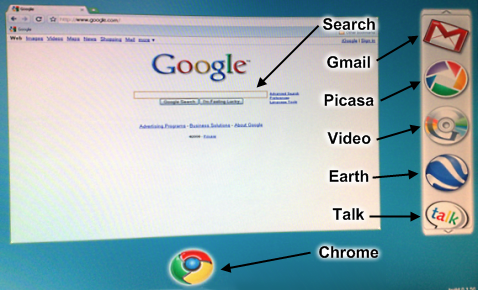Google: Pot, kettle, black, Chrome OS and a potential antitrust

Last week, TechCrunch posted some more screenshots which allegedly purport Google's new operating system, Chrome OS in the works.
What struck me was the number of Google products already bundled in the operating system, as you can see:
Now, I've mentioned before the tit-for-tat battle over Internet Explorer and the dispute in an ever-continuing scuffle between the EU and Microsoft, but what my colleague Mary Jo Foley has mentioned some time ago was that Google stepped into the row.
To cut a long story short, the EU was annoyed at Internet Explorer being included in Windows because it dominated the market by bundling a browser with an operating system. Google stepped in because they have a browser, Chrome, which has a smaller market-share but is steadily increasing.
But now Google is working on an operating system to directly rival Microsoft, which in itself was a bold yet brave move. In the meantime, Microsoft is still being anti-competitive in their "let's crush the rival [Google] and make one hell of a spectacle about it". I wasn't happy.
After looking through a number of posts which offer clues as to what is in Google's highly anticipated operating system, most of the "applications" provided will run through the browser. But the rest - such as Google Earth, Google Chrome and Google Talk will be bundled with the operating system.
Google Chrome is the Internet Explorer equivalent, clearly, whereas the remaining applications rival those of Windows Live. The comparison is important to note.
Why can't Microsoft ship a Windows edition without including a browser (or at least come under fire from a zillion lawsuits) yet Google can? And with this, Google is entirely contradicting itself by doing something it opposed Microsoft from doing. Just because they have a smaller market-share doesn't exempt them from the practice.
On an interesting note, Prof. Eric Clemons who specialises in this field claims:
"The fact is, Google almost doesn't have any competitors. Google could kill anything it wants to."
While even I initially thought the quote was misguided and just plain wrong, he goes on to explain. For instance, the price of most products Google provides to its users: free. Android is provided as a free open-source operating system and so will Chrome OS. I can understand the antitrust motions for Microsoft as it is providing a paid-for operating system whereas in terms of free operating systems, besides Linux, there aren't any.
Regardless of this, does the antitrust concept solely rely on paid-for software? Whether or not a product is free to the end user would not stop it from being anti-competitive because the reign Google has over the "free Internet" is huge.
By providing a product for free can entirely alienate an entire market. Revenues can be generated online nowadays through online advertisements and user information being shared between companies. If a company can afford to invest millions into a free operating system tied in with their search engine which offers advertising already, the price would benchmark at $0 and there could potentially never be another paid-for operating system again.
How do you compete with free? By providing a better, more sophisticated free. From there, the online world builds up further and further as a supply of money-making advertisements, and the concept of revenue generation has changed forever. The free operating system manufacturers would earn money as they go through users' browsing rather than the numbers of product box-set's they sell.
This is where I want you to come in. Please, by all means, jump in at any point because frankly, I cannot see how Google can progress forwards without kicking up one almighty antitrust suit which could not only potentially destroy the company in revenue but reputation. And in comparison to Microsoft, Google may well be a polished turd but at least it's pleasing on the senses.
